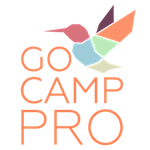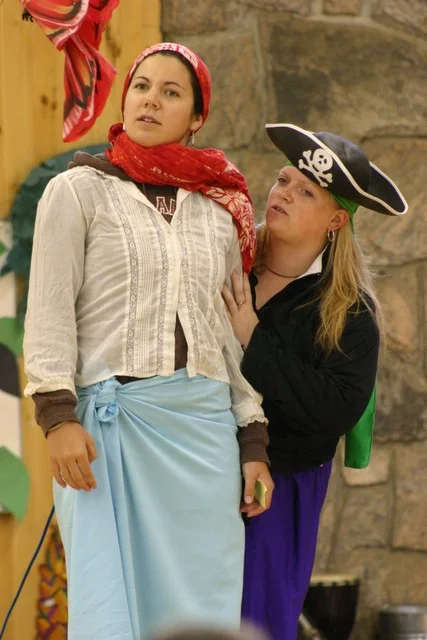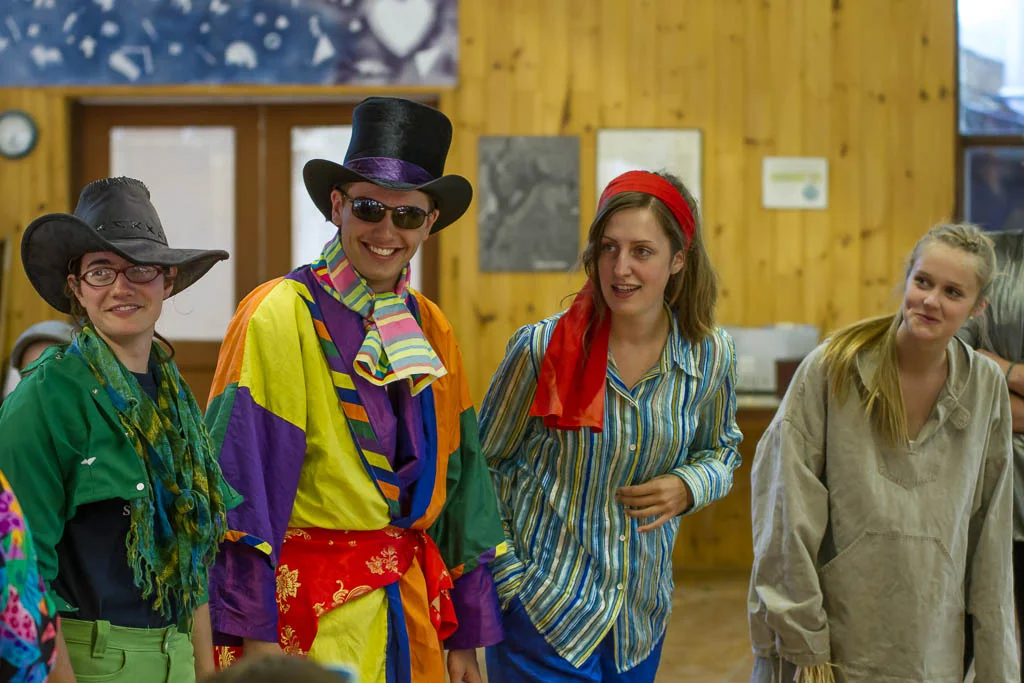Innovative Game Creation from the World's Best - A Guest Post
Lighting the Spark - Strategies and Tips for Innovative Summer Camp Game Creation
by Tom Cox, Matthew Malecha, and Stephen Thomson of Trailhead Games.
Editor's note: If you don't know Trailhead Games, you will soon. Their team hails from the camp-famous Camp Augusta, and they've already disrupted the world of games at summer camp without most people even knowing about it. Their insight here is priceless, and I'd guess even the most creative and immersive camps could benefit greatly from diving into their worlds of wonder and fun. On to the article!
Camp is the most creative place we know... so it makes sense that camp programming reflects the wildness, the zaniness, and the madness of the people there. We're going to share some strategies that have worked for us in taking the traditional camp games and turning them into immersive worlds with challenges, characters, skits, soundtracks, and stories too. We’re talking about taking camp programming to the next level…and beyond.
Our focus for this blog post is adding creativity to large group games. James at Go Camp Pro has created a great blog post and video on large group summer camp games and their potential benefit for your camp. Check it out here. We're assuming you're sold on trying out the idea, so let's get down to it. Let's get down to it.
Lighting the Spark: Coming up with Game Ideas
Sometimes the hardest part is coming up with an idea for the game because we can easily get stuck trying to come up with a complete concept to start. Games of this scale are rarely formed that fast! So, we’re looking for a simple concept; once you have that initial spark, often ideas can snowball into something that takes on a life of its own. Here are 8 strategies to start taking your traditional games to the next level.
Strategy #1: Adapt an old game: As James mentioned in his blog post, changing and adapting a few rules from Capture The Flag allowed his camp to create 00 Frisbee, which led to Space Police. Using a game you’re very familiar with and then changing some of the rules to create a new experience can be a great way to begin to experiment with creating your own games.
Strategy #2: Overlay themes: You might choose to focus on creating new games by adding some story elements, rather than trying to come up with new game mechanics from scratch. Using source material that campers might already know and love can help them engage with the game.
For example your camp might be used to running Capture The Flag with two teams but if you expand it to 4 teams, and make each team a house from the Harry Potter series (Gryffindor, etc) then you’ve got a fresh and exciting game the campers will be excited to play. From there it’s not a great stretch to think about changing the flags to wands or snitches, giving appropriate-colored bandanas, and introducing staff members acting as Dementors who can tag the campers even in their own area!
Originally, our game Element Zero was conceived of using the game mechanics of fishy fishy. When we scaled it up, outfitted it with a futuristic space theme, added characters like Albert Newton, and started adding themes of 'patrols' and 'smuggling', it became an entirely new world for campers to explore – all from a simple game our campers had played for years.
Strategy #3: Start with props you have available: Often camps don’t have the budget to invest heavily into bringing a new camp game to life, and might not be able to afford to buy materials needed to make an idea work.
A simple way around this is to take stock of what resources you do have, and think of how you can build a game around them. For example, we had an automatic ping pong ball cannon that we wanted to incorporate into a game so we wrote it into Time Castle as the villain’s defensive weapon.
Your camp might have a lot of:
- Inflatable inner tubes - Hula hoops - Tennis balls - Pogo sticks - Foam weapons
What kinds of games can you make out of what you already have? Especially if you happen to have one particularly unique prop – using that as the inspiration for an all-camp game can help solidify it within your camp’s culture and make it truly “yours.” Think about what resources you have in abundance and see where that leads you!
Strategy #4: Start with a character: Camp staff are great at making up funny and memorable characters. One of your staff members might have a hilarious character/talent you could base a game on, which is what we did when we decided we wanted to use The Funky Flashman in Stephen’s game, Time Castle. He was already a much loved character around campfires and short skits, so it was almost an “Easter Egg” for kids to discover him in this new world they were playing in.
You could also base a game idea on a character you have created for another game. For us that was Ragetron, who first appeared in a superhero game we created called BLAMMO, before Matthew decided to use that character as the inspiration for Robot Apocalypse: Y3K. Spinoffs and sequels work well – take characters your campers are already familiar with and develop their story for a new experience.
Strategy #5: Start with an intriguing game mechanic: After creating a few games, Tom thought it would be interesting to create a game world based on concentric circles: the further you went out, the harder the game would become. From that notion Into The Deep (soon to be free to Go Camp Pro members!) was born and Tom turned the expanding circles into “shallow water” and “deep water” and made rules and characters accordingly.
You might try designing a game around: 1) Zones whose controllers change over time depending on in-game cues (like we did with Windrunner) 2) A multi-scoring potential team station game (like in Around the World) 3) Moving/dynamic boundaries (as we did with Time Castle) 4) Changing roles and objectives (such as Element Zero) 5) A King of the Hill style, team-up game (as we did in Kingdom Rush) 6) 2 beats 1 tag rules in shared zones (as we did with Never Never) 7) A rock-paper-scissors tagging dynamic in open space (as we did with Giants Wizards Elves) 8) Limited “air supply” that determines how long the campers can move before needing a refill (as in Flute McGinley) 9) A unique scoring system such as points running out each day and the team having to stay above 0 (as we used in Smashee Smashee)
Strategy #6: Start with a grand vision: After seeing how much campers loved competing against each other in a variety of games, Tom set himself the challenge of trying to create a game that would be purely cooperative and still be fun and engaging. He knew this would be tough and that the individual elements of the game would all have to be very unique and memorable. As a result he created The Incredible Adventures of Flute McGinley: Defy Gravity and created dozens of individual stations, missions and an individual player leveling up system to ensure the campers had enough fun things to do to keep them engaged for the full hour. Are there pieces of your camp culture that you want to highlight or inspire? Think of what values you want your campers to interact with, and build a game structure around those values to provide a ultra intentional experience.
Making it Possible: Tips for Implementing
So you have at least 6 starting places now. But who's to do the starting? Large Group Games come from people who are inspired, well-versed, and dedicated to the potential of them. Below are two tips for you to take these starting places, and spread them to the culture of your camp.
Tip #1: A creative camp culture: This is our biggest tip for creating amazing camp programming.
The five of us at Trailhead Games were fortunate enough to meet at a camp that had a huge focus on creativity. We had a 7 year rule which meant if we played a game one summer, we wouldn’t play it again until 7 summers later (even if the campers loved it!) We were pushed to come up with new, creative games each summer and we loved the challenge.
Set your camp and your staff up for success by pushing them to be creative on a regular basis – even on a smaller scale. You’ll be surprised by the results. Make creativity an expectation and plant seeds of possibility in them. Simple challenges like waking campers up in a creative/fun way each morning or having daily impromptu skits are great ways to create a focus on creativity within your camp’s culture. Give them the starting framework for a game or character, and push them to expand on the idea. Your staff will rise to the challenge. This is the best way to get new ideas for games from your very own staff.
Tip #2: Gamemasters: At the camp where we all met, two of the staff positions that were available were for “Master of Fun and Games”. Someone dedicated to fun and innovation, whose sole goal was to organize and mastermind taking both organized and impromptu programmatics to the next level. Right now, that might be you, and you might have a whole load of other things on your plate!
Consider having someone with experience in charge of immersing themselves in games for the summer. Someone who can draw from and support the creativity of the staff (as in tip #1), and who can organize and mastermind these large group games running to their full potential. Logistics guru, inspiring visionary leadership, and a deep love for games are essential!
If you have other ideas on how to come up with great ideas for new games, we’d love to hear them.
If you’re interested in revitalizing your camp’s programming, stop by our website and say hello: www.trailheadgames.com.
We are always happy to chat games, and help you come up with ideas that work for your camp, as is the Go Camp Pro crew. From all of us at Trailhead Games – here’s to an amazing summer full of innovative games!




